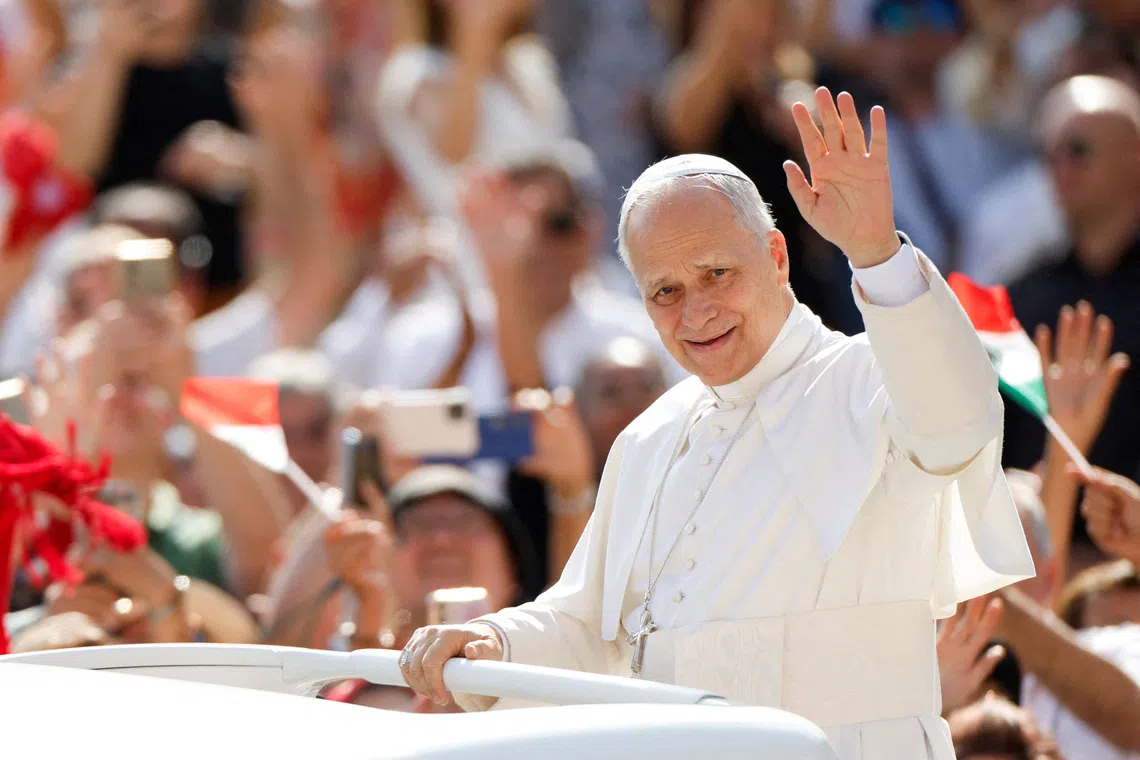Pope Leo plans to keep his predecessor’s key reforms but avoid bigger changes
Sign up now: Get ST's newsletters delivered to your inbox

Pope Leo has avoided directly criticising US President Donald Trump and calling out Israel for the “genocide” in Gaza.
PHOTO: REUTERS
VATICAN CITY – Pope Leo XIV will keep Pope Francis’ signature policies to welcome gay Catholics, discuss women’s ordination and give China input on bishop appointments, but is not planning big changes to Church teaching, he said in his first interview, released on Sept 18.
Pope Leo, who became the first American pontiff
But showing characteristic reserve compared to his predecessor, Pope Leo shied away from directly criticising US President Donald Trump or from saying that Israel has committed genocide.
The interview was conducted at the end of July for a biography being published by Penguin Peru. Initial excerpts were published on Sept 14.
“I don’t plan to get involved in partisan politics,” said Pope Leo, who was raised in Chicago. “There are significant issues that can be raised, but it would be impossible for the Pope to get involved in individual countries around the world.”
Pope Leo likewise repeated Pope Francis’ firm condemnation of the sexual abuse scandals that have afflicted the 1.4 billion-member Catholic Church across the world, but also expressed concern about false allegations against priests.
‘Great concern’ over Gaza
Pope Leo, 70, has shown a more reserved style than his predecessor, who often gave interviews, spoke frankly about world events and sharply criticised both Mr Trump and Israel.
Pope Francis, who led the Church for 12 years, suggested in late 2024 that Israel might be committing genocide in Gaza, drawing a backlash from Israeli leaders.
In the interview, Pope Leo said he has “great concern”
“The word genocide is being thrown around more and more,” he said. “The Holy See does not believe that we can make any declaration at this time about that.”
Pope Leo also said he has not yet spoken with Mr Trump but indicated that he has raised concerns about the administration’s crackdown on migrants when he met with US Vice-President J.D. Vance
“I talked about human dignity and how important that is for all people, wherever you’re born,” Pope Leo said about that meeting.
“Obviously, there’s some things going on in the States that are of concern,” he added. “We continue to look for ways to at least respond and raise some of the questions that need to be asked.”
Falsely accused priests
Pope Francis approved a landmark agreement with China in 2018 that gives government officials some input into papal appointments there.
Some conservative Catholics have criticised the deal as giving China too much influence, but Vatican officials stress that the Pope retains final decision-making power.
“In the long term, I don’t pretend to say this is what I will and will not do,” Pope Leo said about the deal. “In the short term, I will continue the policy that the Holy See has followed for some years now.”
On the abuse scandals, which have damaged the Church’s standing as a moral voice, Pope Leo said victims “must be treated with great respect and with an understanding that those who have suffered... carry those wounds for their entire life”.
Pope Leo also voiced concern about false allegations.
“Statistics show that well over 90 per cent of people who come forward and make accusations, they are authentically victims,” he said. “But there have also been proven cases of some kind of false accusation.”
Pope Francis largely tried to open up the staid Church to the modern world, drawing criticism from conservative Catholics, even some cardinals, who worried he was watering down the Church’s strict teachings.
He issued a decree in 2023 allowing priests to administer blessings to same-sex couples
He also created two commissions to study the ordination of women as deacons, an issue previous popes had banned discussion about. The Catholic Church has an all-male clergy.
Pope Leo said he would maintain Pope Francis’ openness toward both women’s leadership in the Church and LGBTQ+ Catholics, but did not suggest further steps forward.
Teaching to remain ‘as is’
“I hope to continue in the footsteps of Francis,” Pope Leo said about Pope Francis’ move to appoint more women to senior Vatican positions.
“The topic becomes a hot-button issue when the specific question is asked about ordination,” he said. “I at the moment don’t have an intention of changing the teaching of the Church on the topic.”
The Pope gave a similar answer about whether the Church could change its teaching to allow same-sex marriages.
“The individuals will be accepted and received,” said Pope Leo, referring to LGBTQ+ Catholics. “The Church’s teaching will continue as it is, and that’s what I have to say about that for right now.”
Pope Leo also addressed the Vatican’s financial woes, which include an €83 million (S$126 million) budget shortfall, and a much larger funding gap in its pension fund.
The Pope said funding was improving.
“I don’t think the crisis is over… but I’m not losing sleep over it,” he said. REUTERS


